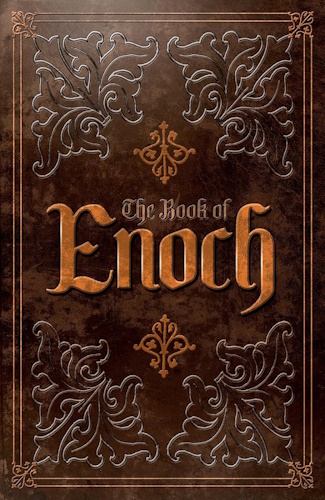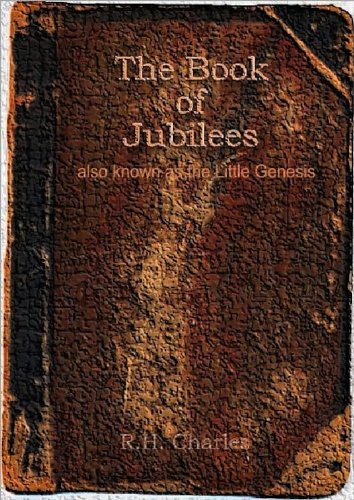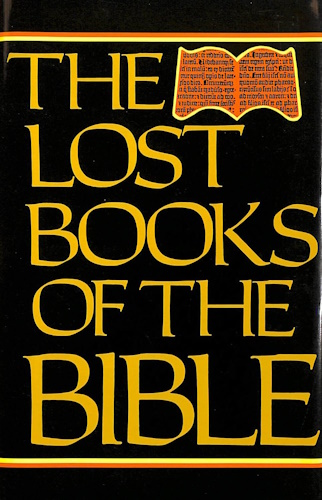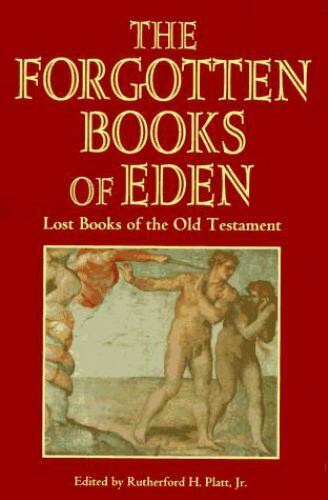
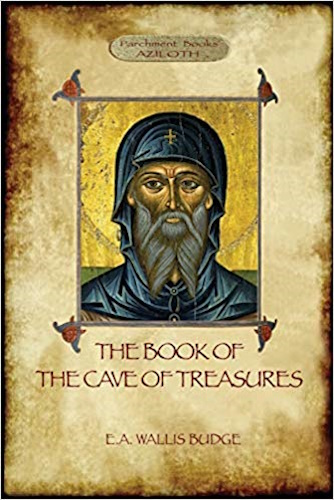
The Book Of The Cave Of Treasures
A History Of The Patriarchs And The Kings
Their Successors From The Creation
To The Crucifixion Of Christ
by
Sir E.A. Wallis Budge, KT.
M.A., LITT.D. (CAMBRIDGE), M.A., D.LITT. (OXFORD),
D.LIT. (DURHAM), F.S.A.
![]()
![]()
p. xi
PREFACE
THE present volume contains a complete translation of the Syriac text of the compendious history of the world from the Creation to the Crucifixion of our Lord, which is commonly known as "Me`ârath Gazzê," or the "Cave of Treasures." In the Syriac title the composition of the work is attributed to Ap[h]rêm Suryâyâ, i.e. Ephrem Syrus, or Ephraim the Syrian, who was born at Nisibis (?) soon after A.D. 306 and died in 373, but it is now generally believed that the form in which we now have it is not older than the VIth century. An edition of the Syriac text, and an Arabic version of it, together with a German translation, were published by Bezold (Die Schatzhöhle, Munich, 1883-86), but this work is scarce and is little known in England. The German translation was made from an eclectic text constructed from at least three manuscripts, which varied in age and accuracy and general literary value. The translation given in the following pages has been
p. xii
made from the best, in my opinion, of all the known manuscripts, namely British Museum MS. Add. 25875. (See Wright, Catalogue, vol. iii, page 1064.) This MS. contains twelve complete works, all of which were written, in a fine Nestorian hand, by the priest Homô, the son of the priest Daniel, a native of Al-Kôsh, a very ancient town which lies about 20 miles north of Môsul (Nineveh), in the year of the Greeks 2020, i.e. A.D. 1709. It was written at the expense of the priest Joseph, the son of Hormizd, a native of Hordaphne, in the district of ´Amediâ, for the church of the Blessed Virgin Mary in that place. When I read through the manuscript in 1885, whilst preparing my edition of the "Book of the Bee," I was convinced that Homô, the scribe, was a very learned man, and the marginal notes which he added to his copy showed that he was at once a capable and an understanding editor of Syriac texts. When the printed edition of the Syriac text of the "Cave of Treasures" appeared in 1886, I was surprised to find that Homô's text had not been made the foundation of the work. Whilst I was in Al-Kôsh in 1890-91 collecting manuscripts for the British Museum, I found there some of Homô's descendants, and of these one or two were professional scribes. They possessed a few ancient Syriac manuscripts, and from one of them I had copies made of the
p. xiii
"Cave of Treasures" and the "Book of the Bee." On my return to England I collated the copy of the former work with the British Museum Codex, and found that the text only varied in a few minor points. There are a few mistakes in the British Museum MS., and in one or two places a few words are omitted, but as a whole it contains the text of the "Cave of Treasures" in as perfect form as ever we are likely to get it; and therefore I have made the translation printed herein from it.
A text of this kind might be annotated to almost any extent, but I have limited my notes to pointing out parallels in the "Book of Jubilees," the "Book of Adam and Eve," the "Book of the Bee," and other cognate works. These are printed within square brackets [ ] immediately following the passages in the "Cave of Treasures" which they illustrate. In the short Bibliography which follows the translation will be found the names of a number of books and of editions of texts which those who are interested in the literary history of the "Cave of Treasures" will find necessary for useful work. I have also added a translation of the "Testament of Adam," a popular apocryphal work which is based upon the Syriac "Cave of Treasures," and upon legends derived from books of a similar, and perhaps allied, character.
p. xiv
The ancient tradition which asserts that the "Cave of Treasures" was written in the IVth century of our Era, is supported by the general contents of the work. These reproduce Ephraim's quaint and sometimes fanciful methods of exegesis and his hatred of the Jews, and supply many examples of his methods in religious argument with which we are familiar from his other writings. We may notice, too, his pride in the antiquity of the Syriac language. That it was written in Mesopotamia by a Syrian, there is no doubt, and if we reject Ephraim as its author, we are bound to admit that the author, or perhaps later editor, belonged to the school of Ephraim. Whichever view be taken is immaterial. For the book certainly contains a mass of historical information which can only have been derived from pre-Christian Hebrew works, or from post-Christian chronologies and histories written in Greek. The writers of such Greek works derived some of their information at first or second hand, from documents originally written in cuneiform. Of the general historical character of the "Cave of Treasures" there is no doubt, and it is this fact which gives it such importance for the history of the Hebrew Patriarchs, and for early Christian History, and the Christian Faith. This view was maintained by the eminent scholars Dillmann, Nöldeke,
p. xv
Sachau, Wright, Bezold and others during the last century, and it was firmly held by Christians in Mesopotamia, Syria, Palestine, Egypt, Nubia and Abyssinia for the fourteen centuries preceding.
On the historical facts which form the framework of the "Cave of Treasures," the pious author, or editor, grafted a whole series of legends, many of which deserve the descriptions of "idle stories" and "vain fables" which have been applied to them by Assemânî and the older European theologians. The reader having perused them will readily understand that such legends, containing as they do garbled history facts and anachronisms, are neither accepted nor endorsed by any member of the Committee of the Religious Tract Society or by myself. These legends were inserted with the view of making the "Cave of Treasures" a sort of religious "wonder-book" which would appeal to the vivid and credulous imaginations of Christian natives in almost every country of the Near East; and religious "wonder-books" were intended by their authors and editors to amuse as well as to instruct. The "Cave of Treasures" possesses an apocryphal character it is true, but the support which its contents give to the Christian Faith, and the light which the historical portions of it throw on early Christian History, entitle it to a very high place among the apocryphal Books of the Old and
p. xvi
the New Testament. These facts have induced the Committee of the Religious Tract Society to order the publication of this the first English translation of the "Cave of Treasures."
My thanks are due to the Trustees of the British Museum for permission to publish a photographic reproduction of the cylinder of Cyrus and photographs of Ethiopic and Syriac MSS.; to Sir Frederick Kenyon, K.C.B., and the late Dr. Byron Gordon for permission to copy the photographs made by Mr. C. L. Woolley, M.A., for the Joint Expedition, of the objects found at "Ur of the Chaldees"; to the Art Editor of The Times for a copy of the photograph of "Abraham's Street" at Ur; to Mr. C. L. Woolley for the use of his notes and descriptions of the antiquities found at Ur; to the Rev. C. H. Irwin, D.D., General Editor of the Religious Tract Society, for his friendly criticisms, and to Mr. H. R. Brabrook for his practical suggestions.
E. A. WALLIS BUDGE
48, Bloomsbury Street,
Bedford Square, London, W.C. 1.
July 30, 1927.
-
Urantia Book, 44:0.11 - The Celestial Artisans
Never in your long ascendancy will you lose the power to recognize your associates of former existences. Always, as you ascend inward in the scale of life, will you retain the ability to recognize and fraternize with the fellow beings of your previous and lower levels of experience. Each new translation or resurrection will add one more group of spirit beings to your vision range without in the least depriving you of the ability to recognize your friends and fellows of former estates.
-
Princess Bride 1987 Wallace Shawn (Vizzini) and Mandy Patinkin (Inigo Montoya)
Vizzini: HE DIDN'T FALL? INCONCEIVABLE.
Inigo Montoya: You keep using that word. I do not think it means what you think it means. -
Urantia Book, 117:4.14 - The Finite God
And here is mystery: The more closely man approaches God through love, the greater the reality -- actuality -- of that man. The more man withdraws from God, the more nearly he approaches nonreality -- cessation of existence. When man consecrates his will to the doing of the Father's will, when man gives God all that he has, then does God make that man more than he is.
-
Urantia Book, 167:7.4 - The Talk About Angels
"And do you not remember that I said to you once before that, if you had your spiritual eyes anointed, you would then see the heavens opened and behold the angels of God ascending and descending? It is by the ministry of the angels that one world may be kept in touch with other worlds, for have I not repeatedly told you that I have other sheep not of this fold?"
-
Urantia Book, Foreword - 0:12.12 - The Trinities
But we know that there dwells within the human mind a fragment of God, and that there sojourns with the human soul the Spirit of Truth; and we further know that these spirit forces conspire to enable material man to grasp the reality of spiritual values and to comprehend the philosophy of universe meanings. But even more certainly we know that these spirits of the Divine Presence are able to assist man in the spiritual appropriation of all truth contributory to the enhancement of the ever-progressing reality of personal religious experience—God-consciousness.
-
Urantia Book, 1:4.3 - The Mystery Of God
When you are through down here, when your course has been run in temporary form on earth, when your trial trip in the flesh is finished, when the dust that composes the mortal tabernacle "returns to the earth whence it came"; then, it is revealed, the indwelling "Spirit shall return to God who gave it." There sojourns within each moral being of this planet a fragment of God, a part and parcel of divinity. It is not yet yours by right of possession, but it is designedly intended to be one with you if you survive the mortal existence.
-
Urantia Book, 1:4.1 - The Mystery Of God
And the greatest of all the unfathomable mysteries of God is the phenomenon of the divine indwelling of mortal minds. The manner in which the Universal Father sojourns with the creatures of time is the most profound of all universe mysteries; the divine presence in the mind of man is the mystery of mysteries.
-
Urantia Book, 1:4.6 - The Mystery Of God
To every spirit being and to every mortal creature in every sphere and on every world of the universe of universes, the Universal Father reveals all of his gracious and divine self that can be discerned or comprehended by such spirit beings and by such mortal creatures. God is no respecter of persons, either spiritual or material. The divine presence which any child of the universe enjoys at any given moment is limited only by the capacity of such a creature to receive and to discern the spirit actualities of the supermaterial world.
-
Urantia Book, 11:0.1 - The Eternal Isle Of Paradise
Paradise is the eternal center of the universe of universes and the abiding place of the Universal Father, the Eternal Son, the Infinite Spirit, and their divine co-ordinates and associates. This central Isle is the most gigantic organized body of cosmic reality in all the master universe. Paradise is a material sphere as well as a spiritual abode. All of the intelligent creation of the Universal Father is domiciled on material abodes; hence must the absolute controlling center also be material, literal. And again it should be reiterated that spirit things and spiritual beings are real.
-
Urantia Book, 50:6.4 - Planetary Culture
Culture presupposes quality of mind; culture cannot be enhanced unless mind is elevated. Superior intellect will seek a noble culture and find some way to attain such a goal. Inferior minds will spurn the highest culture even when presented to them ready-made.
-
Urantia Book, 54:1.6 - True And False Liberty
True liberty is the associate of genuine self-respect; false liberty is the consort of self-admiration. True liberty is the fruit of self-control; false liberty, the assumption of self-assertion. Self-control leads to altruistic service; self-admiration tends towards the exploitation of others for the selfish aggrandizement of such a mistaken individual as is willing to sacrifice righteous attainment for the sake of possessing unjust power over his fellow beings.
-
Urantia Book, 54:1.9 - True And False Liberty
How dare the self-willed creature encroach upon the rights of his fellows in the name of personal liberty when the Supreme Rulers of the universe stand back in merciful respect for these prerogatives of will and potentials of personality! No being, in the exercise of his supposed personal liberty, has a right to deprive any other being of those privileges of existence conferred by the Creators and duly respected by all their loyal associates, subordinates, and subjects.
-
Urantia Book, 54:1.8 - True And False Liberty
There is no error greater than that species of self-deception which leads intelligent beings to crave the exercise of power over other beings for the purpose of depriving these persons of their natural liberties. The golden rule of human fairness cries out against all such fraud, unfairness, selfishness, and unrighteousness.





